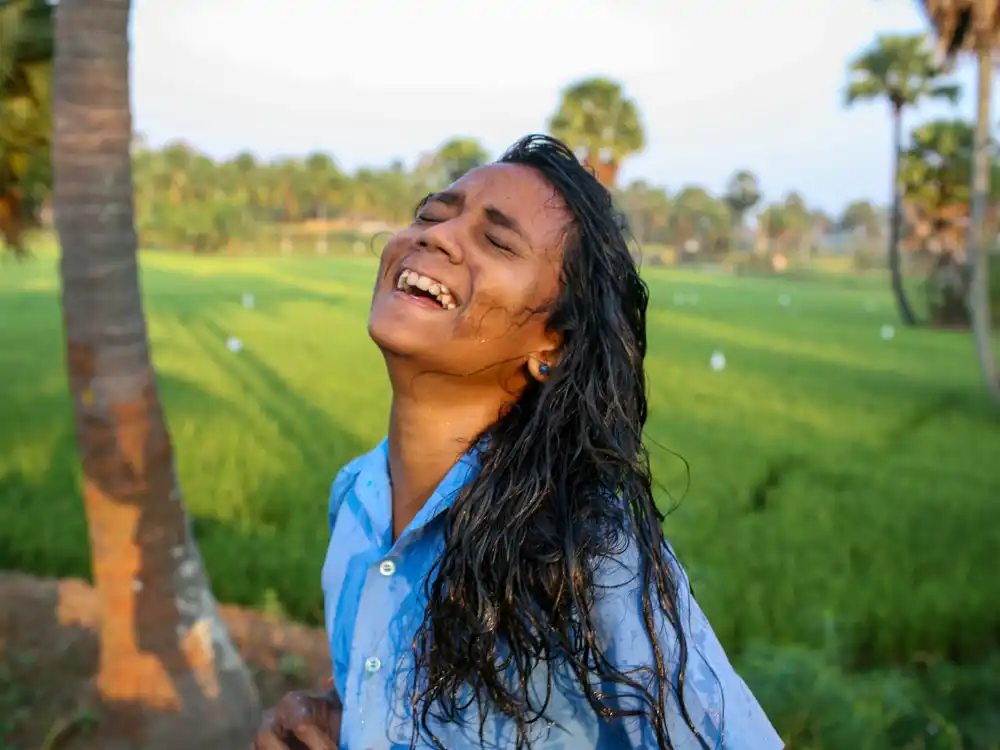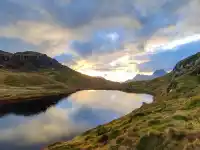The journey to Kerala begins exactly where you stop rushing. Somewhere on a bumpy mountain road, where you stand still for an hour because a cow is lying in the middle of the road, chewing. No one shoos it away. Not because they can’t—but because they shouldn’t. The cow is sacred here. Not an obstacle, but part of the traffic system. And once you learn to wait without frustration, you’re ready for southern India.
This is Kerala: a journey not just through the land, but into the soul of India. After days in the industrial textile city of Tiruppur, where everyone is sewing something, we realized we didn’t need rest—we needed space. So we set out from Tiruppur towards Kerala.
A Road Like a Memory
The road from Tiruppur, winding through the mountains into Kerala, feels like returning to another time. The change in elevation was more than just altitude—it was a passage between worlds. From the industrial buzz of Tiruppur to lush wilderness, where between the trees there are no billboards, no concrete. Just waterfalls, monkeys, and houses that don’t seem to fight time—they simply live with it.
The Countryside That Never Sleeps
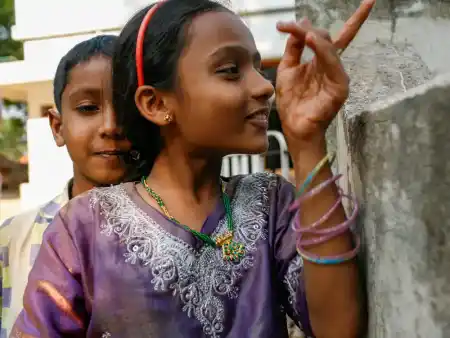

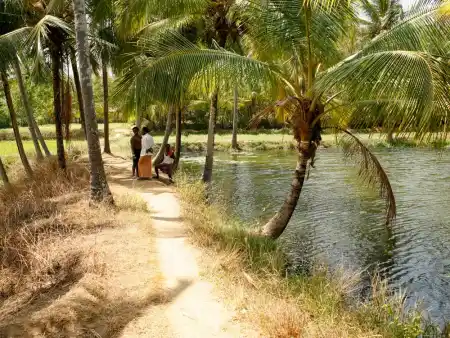

Indian countryside has a strange quality—even in silence, it never sleeps. Someone is always carrying water. Sweeping the front step. Cooking rice on an open fire. People look at you—not with suspicion, but with that typical Indian expression in their eyes:
“Where are you from?” And here, that question means more than just geography.
I stop by the roadside for a coconut. Fresh, chilled. A man with a machete cracks it open with one swing and hands it to me with a straw. We drink the milk. The flesh—what we grate and eat back home—gets tossed to the cows.
The seller doesn’t need an app, a website, or branding. Just a stool and the shade of a tree. The coconut milk is so fresh you want to gulp it down. Don’t. Sip slowly—or you’ll lose your voice.
What’s Different in the South?
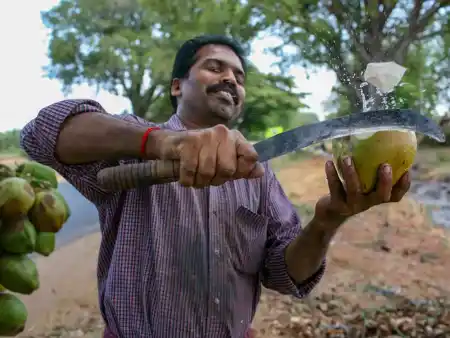
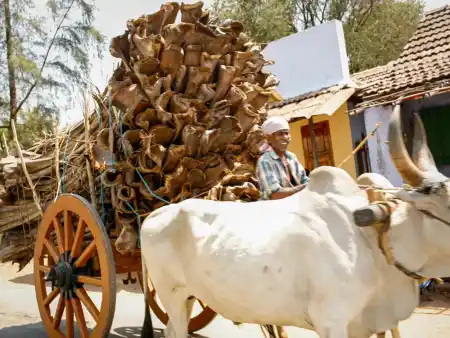
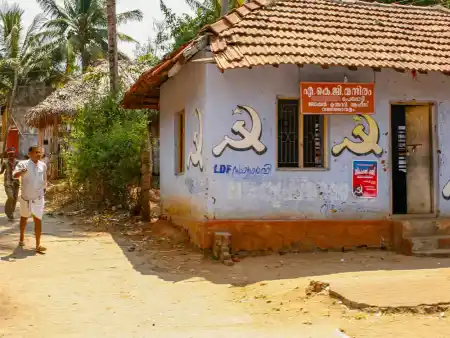
South India isn’t just a direction—it’s a different energy. Different roots. Slower pace. More rain. More green. Less dust, less tension, less politics. Or is it? We just passed the Communist Party headquarters.
People speak more softly here—not less passionately. And everything smells: of spices, incense, and coconut oil.
Kerala itself is an anomaly. The highest literacy rate in the country. The most doctors per capita. A strong Christian community. And—ironically—one of the strongest Communist parties. Church, faith, Communism—side by side. Functioning. No explosions. At least not visible ones.
A Rhythm of Its Own
The village doesn’t follow the market. Change arrives here slowly—or not at all. People sweep dust off their doorsteps just like they did years ago. Cooking starts at six. Water is carried—not tapped. And yet, nothing feels primitive—just differently civilized.
More about people than things. More about time than money.



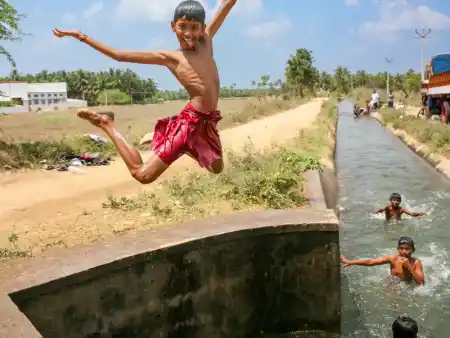
Inside the courtyards, it’s unexpectedly clean.
As I descend from the hills toward the sea, memories begin to surface—of the original ashram of Sri Tathāta. A forgotten village near Pallakad in southern India. A place with no windows, no doors, no fences. At the edge of rice paddies and coconut groves. Barely known back then. We slept on the floor, ate off banana leaves, and mostly—we stayed silent.
Sri Tathāta – Wisdom Without Noise
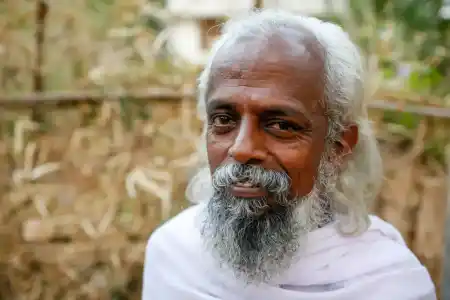

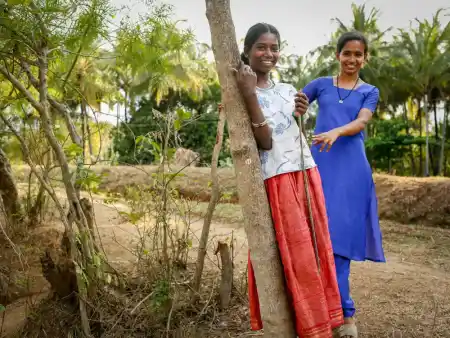
His ashram was small. A tin roof, a few students. No windows, doors, no fences. If you wanted to come, you came. If you wanted to leave, you left.
He preached simplicity. He taught that truth isn’t found out in the world—but in the silence between questions. Sri Tathata wasn’t a revolutionary, nor a guru with a brand.
More like a grandfather who knew a lot, but wouldn’t speak unless you asked.
He said peace doesn’t come from the outside. That discipline is the greatest freedom. And that the world doesn’t need more noise—it needs more inner order.
He and the village lived in perfect symbiosis. They gave each other what the other needed. One old woman told me: “Joy and a smile—that’s all we really have.”
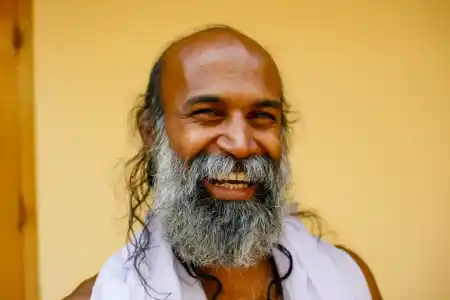

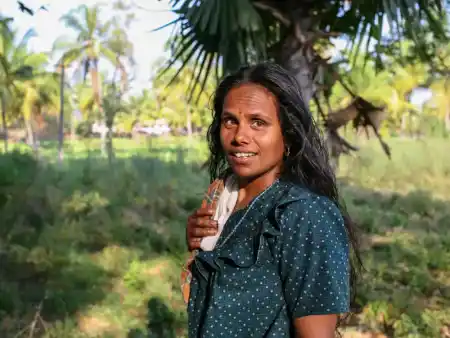
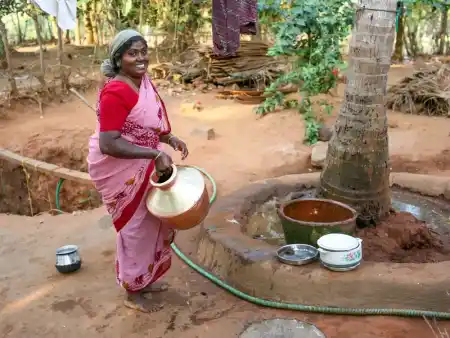
A Real Miracle
One day, walking under the coconut palms with the enlightened one, he turned to me:
“Fancy a coconut?” He raised his hand—and a coconut fell beside us. A miracle? Only until I looked up and saw a village man up in the crown of the tree, pruning. On cue, he sliced one off. And it landed at our feet.


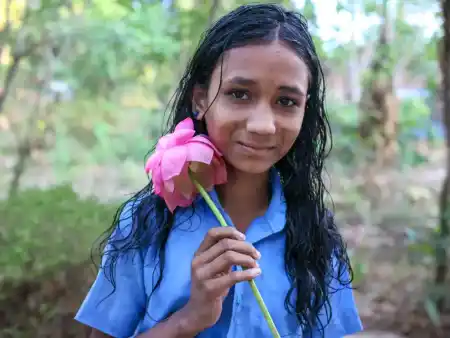
A few moments later I passed a pond where a young girl was washing her school uniform. She stepped into the water, rubbed her cheeks with mud, picked a floating flower, and held it to her face. Ready for a portrait. “Now you can,” I have read in her eyes. In the stillness, the light, the greenery, the purity—I felt it.
That this moment—this—is paradise.
And do you know why she smeared her cheeks with mud? A French woman once gifted her a copy of Vogue. The girl saw beautiful women wore makeup. That Vogue was her only treasure. She kept it guarded a years in her tiny room.
The Hardest Hours
In Kerala, nights are the hardest. At 3 a.m., it’s 42 celsius degrees. Sleep is impossible.
You sit outside on the steps, staring at the stars and slowly absorb the contrast of worlds.
Audience with Sri Tathāta
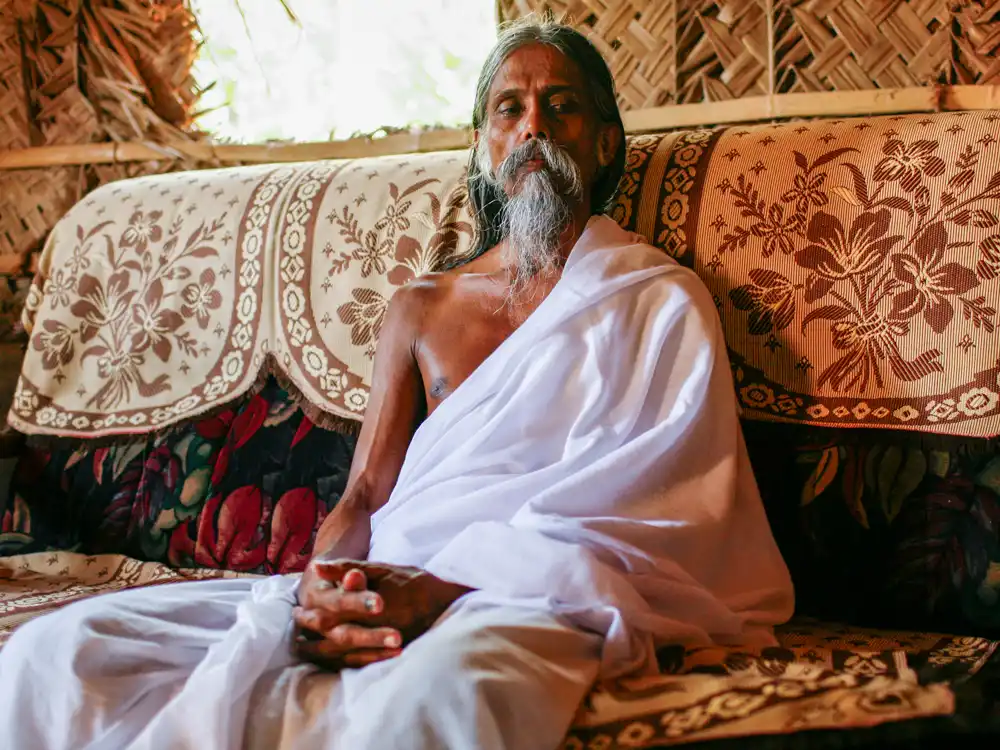
People from modern worlds come to India in search of something. After three days of waiting, three of us met Sri Tathāta.
First, a young Frenchman. He had waited over two weeks. In that time, he helped villagers, and brought fresh bananas to the guru every day. An IT programmer. Earns well. Has his own apartment in Paris. But he’s alone. And unsatisfied.
“Search within yourself,” said the guru. “Life will show you the path.”
Next, a man in his 60s. A successful businessman. A father. Has a big house. Cottage. A loving wife. Two children. And he’s fallen in love with a 23-year-old woman. The love is real, and returned. He doesn’t know what to do.
“Let time pass,” said the guru. “Time will solve everything.”
A wise answer, I thought—maybe a little too wise. Perhaps he does have answers to all the world’s problems.
From Silence to Spectacle
Sri Tathāta eventually moved to Darmapetham in Kollur Udupi district of Karnataka. Today, he lives in a modern, expensive, slightly tacky complex, surrounded by giant parking lots. Hundreds come daily. Rituals. Programs.
Why does every path of simplicity and truth eventually lead to pomp and spectacle?




From the original ashram and village, only the feeling remains. That feeling of purity and paradise. His words, now wrapped in concrete and scheduling, feel less like wisdom—more like branding.
But people still come. Some with burnt-out eyes. Some with notebooks full of questions and instructions for meditation. Maybe everyone searching for the same thing: a silence that isn’t empty.
What Are We Looking For?
Mostly the same: peace. Meaning. A story deeper than invoices and meetings.
Many Europeans come from cities with ultramodern apartments—but no place for the soul.
In Kerala, they don’t expect comfort—they’re looking for contrast.
Maybe we’ve lived too long in flats where everything works, but nothing lives.
Hard drives full. Mornings empty. Facebook full of friends. No one close by.
Kerala doesn’t dazzle—but it cleanses. You won’t find luxury. But you will find a fresh coconut in the heat. A temple where no one explains anything—but somehow you understand.
People who don’t know you—but greet you like you belong.
Kerala as a Mirror
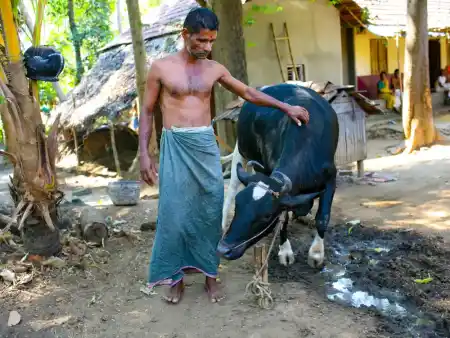


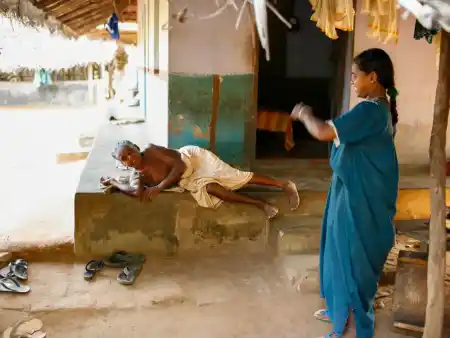
Somewhere between green rice fields and 6 a.m. prayers, I realized—
Kerala isn’t a place you go to. It’s a place where you return to yourself.
And maybe that’s why it felt even more authentic than Tiruvannamalai.
You come seeking peace—and you find it.
A countryside where roosters interrupt prayers. Where Wi-Fi fails, but the heart works fine. Where the confrontation between a European and an Indian doesn’t end in argument— but in shared silence, when there’s nothing to say.
Sometimes not even a way to say it. So you both watch the same sunset.
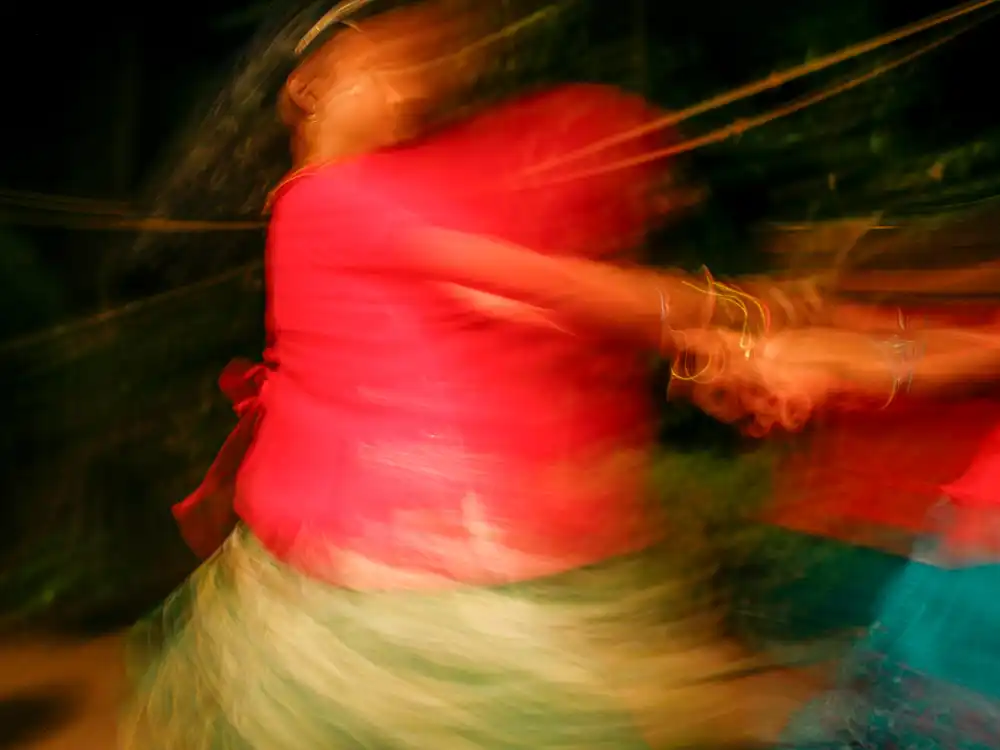
Kerala won’t give you answers. But it gives you a floor to lie on with your questions.
No windows, no doors, nor fences.
And if you’re willing to not rush— you might find you’re looking for less than you think. And you already have more than you knew.

